 Congratulickations to Cave Caneiste Doug Kearney (photo, The Other Project Blogspot), who received a Whiting Foundation Award for his sustained, exemplary and ongoing poetic magification. Doug is a poet, performer, librettist, educator, professor, a high performance lyric man-machine, with one of the hairiest chests of any wordsmith I've ever known (one notices these things). If he comes to your corner of the great American literary showgrounds, catch him because he and his work are definitely worth seeing. He levitates and makes words do so too. Really, he does.
Congratulickations to Cave Caneiste Doug Kearney (photo, The Other Project Blogspot), who received a Whiting Foundation Award for his sustained, exemplary and ongoing poetic magification. Doug is a poet, performer, librettist, educator, professor, a high performance lyric man-machine, with one of the hairiest chests of any wordsmith I've ever known (one notices these things). If he comes to your corner of the great American literary showgrounds, catch him because he and his work are definitely worth seeing. He levitates and makes words do so too. Really, he does.***
This weekend four writers came to town for two events through the good graces of the International Writers Program at the University of Iowa, my colleagues Reg Gibbons and Stacy Oliver, the university's Center for the Writing Arts, and the Guild Complex in Chicago. They were Leila Al-Tarash (novelist and media producer, Jordan); Tarek El-Tayeb (poet, playwright, fiction writer, essayist Austria and Egypt); Yael Globerman (poet and fiction writer, Israel); and Gutierrez "Teng" Mangansakan II (poet, fiction writer, film producer and director, Phillippines). The first was a classroom conversation at the university. As they did last year, the writers spoke on Friday to an audience of our students and faculty members, talking about their lives and work in the context of their societies. A few highlights include El Tayeb's discussion of his start as a storyteller when very small as a means of self-protection and enchantment of a wilder, older schoolmate, and his belief that his work was an attempt to write about something he'd lost; Laila al-Atrash's exploration of the censorship of her work regarding its religious content, though once sexually taboo material is permitted, and of the necessity of having had to balance a full-time career in the media with her writing, which she's been able to devote much more time to; Yael Globerman's commentary on the waves of immigration that have marked Israel and Israeli literature, and her sense that the silence about what had happened in Europe--the Holocaust--had been broken by David Grossman first and then increasingly addressed by subsequent generations of writers, as was the case with the silence about Arabs in Israel, which was also now part of Israeli literature; and Tang Mangansakan's disquisition on moving from the geographical periphery (Mindanao, in the south) to the cultural center, in Manila, and writing in English, one of the colonial and now predominant languages in the Phillipines.
One moment that particularly interested me was the somewhat contentious but good-spirited back-and-forth between al-Atrash and Globerman over the issue of immigration, home and the Other in Israel; al-Atrash was a native of Palestine, and her perspective differed from Globerman's, though they came to agreement with al-Atrash's comments about the great fear of the Other, the sense that the person whose life was in so many ways similar and geographically close but fundamentally unknown was monstrous, terrifying, a grave threat, and yet, over the years, that sense of Otherness had broken down, though not without a great toll levied through the years. Their dialogue was, if I may sound somewhat trite, symbolic of the dialogue that is ongoing. Another moment that particularly caught my ear was when Teng Mangansakan talked about his own blogging (his site is Funktional Schizophrenic), which he saw as a means and form of writing, and of building audience. Through review of his site counter, he learned that about 60% of his readership was in the US, and he not only was making money as a blogger, but also selling books through the medium. He also mentioned his video essay Jihad, about his own personal jihad as a queer Muslim Filipino, and I do hope to see it and more of his work if and when they appear at one of the local film festivals or on DVD.
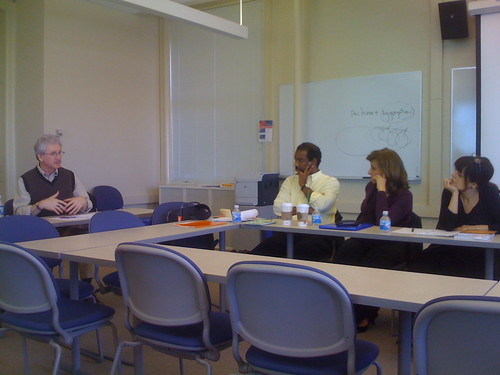
Reg, Tarek, Yael and Laila at the Friday morning event
On Saturday, along with Chicago-area writers Tony Trigilio and Paul Martínez Pompa, I joined them on a panel discussion, entitled "Migrating People, Migrating Literature," that was part of the Chicago/International Writers Exchange. It was hosted by the Guild Complex at the Chopin Theater on the edge of Wicker Park (Real World Chicago!) and Humboldt Park (you've got it, Saul Bellow's old stomping grounds). Many thanks to Reg Gibbons, Michael Puican, Ellen Placey Wadey, and everyone affiliated with the Guild Complex who staged this event. I believe it was taped and will be available soon via audio, so I'll post the link when I have it. We had to write short pieces about migration before the event, but we mostly discussed other things, ranging from translation to politics and writing and the politics of writing to the various ways you might study literature to various kinds of authenticities. It was a joy to meet Tony and Paul, and converse publicly with the visiting writers, and I only wish they didn't have to head back to Iowa so soon. Below are a few photos from both the second event.
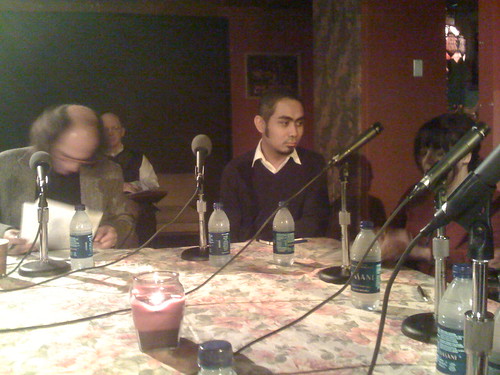
Tony, Teng and Yael before the conversation
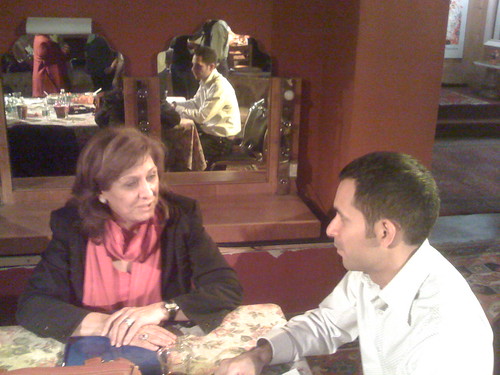
Laila and Paul after the conversation
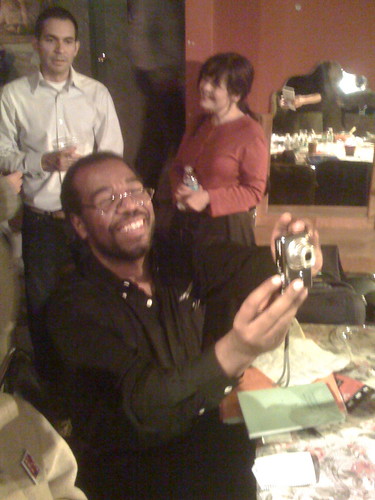
Paul, Tarek and Yael
***
Also this weekend, the university held a conference commemorating the courageous protests, led by Black students enrolled 40 years ago, which led to the establishment of the now renowned African American Studies department, increased admissions of Black and especially poor and working-class Black students, more Black faculty (because of them I have my job!), and number of other changes that have made the campus more hospitable to Black students and other students and faculty of color.
One of the highlights was hearing poet and fiction writer Angela Jackson, whom I'd previously written about when my colleague Ed Roberson held a mini-conference last year on the Black Arts Movement in Chicago, read from her forthcoming novel, Where I Must Go, about that episode and related events. It will be published by Northwestern University Press next July, and if the excerpt I heard, which involves a number of the university's Black students visiting a revolutionary on the South Side of Chicago and having their eyes opened, figuratively and literally, by his critique of them, their education, and their belief systems, is a harbinger, this will be a remarkable work. Angela is a poet of true grace and wit, and the selection she read showed she had recaptured that era vividly and distilled it, deploying her abundant lyric and dramatic talents in the process. It will be interesting to read this novel's likely critique of the Black bourgeoisie's and the revolutionaries' sometimes intersecting, sometimes conflicting aims, especially in light of our current era, when their convergence has taken the symbolic and material form of a nationalist and post-nationalist dream likely to come true in the form of Barack Obama. What I was so aware of, as I listened to the notes of recognition among the audience members, so many of them alumni or the heirs of that era, was that this current would not have been possible without them, and it was part of their vision, even if different what they envisioned.
They are all my heroes.
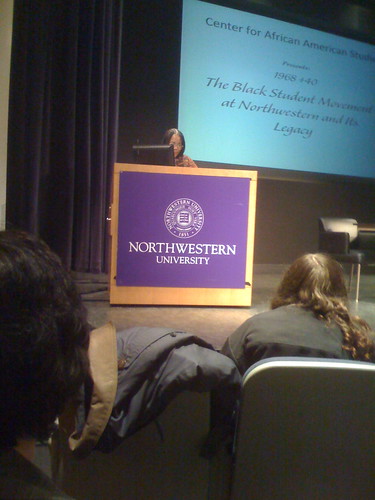
Angela Jackson reading from her forthcoming novel Where I Must Go
***
Earlier today I saw the very sad news that Madelyn Dunham, Senator Barack Obama's grandmother, passed away today. She was 86 and lived in Hawaii. He had lived with her during his high school years, and had just gone to visit her a few weeks ago when she became gravely ill. My offer my sincerest condolences to Senator Obama and his family, and I wish she could have lived to see the outcome on Wednesday, because I strongly believe he will that he'll be victorious tomorrow.

Here's a link to Ta-Nehisi Coates's thoughtful and moving Atlantic Monthly commentary on and tribute to Obama's grandparents.
Senator Obama's comments on his grandmother are here (in text and video form).

My condolences also to the family of Illinois's senior Senator, Dick Durbin, whose 40-year-old daughter, Christine passed away after a lifetime struggle with heart disease. My thoughts go out to him and his entire family. I should also note that Senator Durbin is running for reelection, and has been one of the few consistently outspoken liberals in the Senate. He is on track to return to the Senate with a very large margin of support.









No comments:
Post a Comment